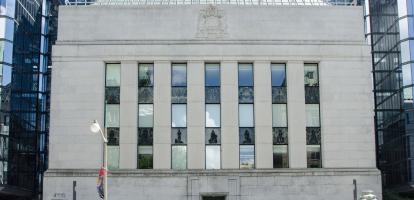The New Year traditionally arrives with resolutions and a fresh start at self-improvement. Here’s one simple suggestion for all political leaders: Embrace more realism in public policy. Let’s consider five areas in which Canada has clear goals, but falls short of realistic plans to achieve them.
First, inflation control. Fiscal authorities must not add more fuel to the inflation fire with new spending even as the Bank of Canada wields its interest-rate hammer. Ottawa needs to show more realism about its spending ambitions. Inflation control is a whole-of-government responsibility. After years of record-breaking spending and deficits, we need a credible plan to improve the nation’s finances and ensure that the burden of paying for pandemic-related spending does not fall mainly on today’s youth.
Second, climate change, which is a priority for Canadians. The federal government’s net-zero 2030 goal is laudable. What’s missing is any realistic sense of what can be achieved in that time frame. For example, the federal goal is a 42 per cent reduction in emissions from the building sector. But as my colleagues Charles DeLand and Alexander Vanderhoof write in a recent C.D. Howe Institute report, for this to be achieved “not only would all new homes to be built after 2022 need to be net-zero, but the annual rate of retrofits would need to rise to 516,000 per year. That would mean one home would need to be retrofitted every minute of every day.” That’s not realistic, yet it is official policy. The entire net-zero plan is best described as a triumph of hope over reason.
Third, immigration. One of Canada’s great successes has been broad political support for immigration — a strategic advantage we must maintain. The federal government recently announced an ambitious plan to welcome 500,000 new immigrants per year. Again, it’s a laudable goal, especially with labour shortages and an aging population. But is it realistic? The system is already struggling with historically high application backlogs. How are we to ensure there are enough homes, doctors, and schools to deal with the population growth? Canada’s broad support for immigration may be put at risk if we can’t ensure infrastructure keeps up.
Fourth, health care. Twenty years ago, almost to the month, Roy Romanow released his landmark commission report on the future of health care. More planning and more money, we were told, would fix what was wrong. We got both, but the pandemic exposed the fallacies that either money alone or central planning would rescue us. Canadians are waiting longer than ever for basic health care services, access to doctors or even children’s Tylenol. Canada had seven hospital beds per 1,000 people in 1982. Today, that’s down to just over two beds per 1,000 people. More openness to innovation and competition, including competition from within the public sector, could help Canada make the most of its human and financial resources.
Finally, our place in the world. Many consider the 1960s a high-water mark for Canadian diplomacy and our reputation as a middle power with influence on the global stage. That soft power was backed by a Cold War big stick. Defence spending was well above three per cent of GDP throughout the 1960s but now languishes at about 1.4 percent. In those days we carried sway in part because we were solid contributors. If we want to get real about projecting our values and being a valued member of NATO, we need to get serious about military procurement and develop a plan to meet our NATO commitment to a defence budget of two per cent of GDP.
Unfortunately, this list of policy areas where realism is lacking could be made much longer. Even more cynicism about politicians’ ability to see their promises through is a luxury we can’t afford. A backdrop of weak productivity growth and capital investment means Canada does not have endless room for costly mistakes. Our leaders can avoid cynicism-fuelling errors if they level with the public about how together we can — realistically — achieve our ambitions.
We are at a pivotal point in history, with geopolitical realignment and a technological revolution spreading through the economy. Canadians deserve realistic plans to tackle big important environmental, social and economic goals. They are capable of having serious conversations about the trade-offs that will be necessary. True leadership requires starting the dialogue and injecting more realism in how we confront issues. Canadians are clearly up for it. Our political class should make it a New Year’s resolution and lead the way.
Duncan Munn is president of the C.D. Howe Institute.
Published in the Financial Post





